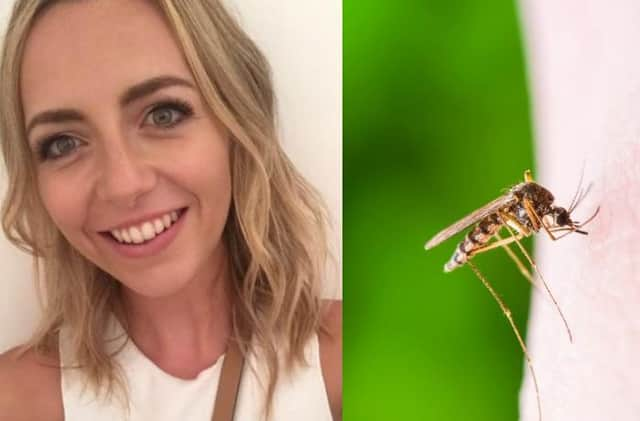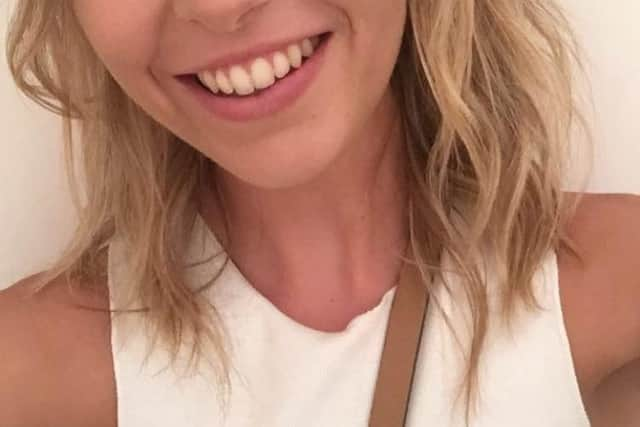Mosquito bite and contact lens left Edinburgh woman blind in one eye


Charlotte Clarkson was left blind in one eye after contracting rare eye infection, Acanthamoeba keratitis, while working on a summer camp in Canada.
She has linked up with eye research charity, Fight for Sight, to take part in their “20 Voices for 2020” campaign which aims to raise awareness of the personal impact of sight loss.
Advertisement
Hide AdAdvertisement
Hide AdAcanthamoeba keratitis is an extremely rare and dangerous infection that is associated with poor contact lens hygiene, such as wearing contacts while swimming or in the shower.


Research by Fight for Sight conducted in 2018 found a threefold increase in the infection since 2011. Almost a quarter of the patients who contract the infection experience sight loss or total blindness in the infected eye.
One day, while on a work shift in Canada, a mosquito flew into Charlotte’s eye. She proceeded to carry on as normal and inserted her nocturnal contact lenses before bed that night. Days of discomfort followed, eventually culminating in a bloodshot, swollen and painful eye.
A trip to the eye clinic led to a misdiagnosis of HSV keratitis, a cold sore of the eye.
Advertisement
Hide AdAdvertisement
Hide AdOn her doctor’s advice, Charlotte eventually returned to Edinburgh in September 2018, but her eye trouble was far from over. In the following two months, she continued to experience periods of eye pain and redness.
Finally, in December, after awaking in severe pain and unable to see out of her right eye, Charlotte tested positive for Acanthamoeba keratitis. She was admitted to hospital, six months after she was initially infected.
Over the four days she spent in hospital, she was administered antiseptic eyes drops several times per hour, 24 hours per day.
In the two months following her release from hospital, Charlotte had to remain indoors to avoid light, and wear an eye patch, sunglasses and a hat.
Advertisement
Hide AdAdvertisement
Hide AdSpeaking of this period, she said: “It was a very lonely and isolating time for me. I was bed-ridden but I couldn’t even watch a movie or read a book because the world was literally too bright for me. My friends would message me but I couldn’t even look at the phone because I was constantly lying in bed holding icepacks to my face to try and numb the pain.”
Despite having finally been able to return to a relatively normal life, Charlotte still cannot see out of her right eye.
“To regain my vision, I would need to have a corneal transplant, which I don’t think I want to do because I want to travel again in the future. At the moment my left eye has taken over and I’ve adapted really well, so right now I don’t want to risk it getting worse again.”
Charlotte believes the infection was caused by a combination of the mosquito scratch and getting water in her contact lens. She is passionate about spreading awareness of contact lens hygiene, to ensure others don’t face similar trauma.
Advertisement
Hide AdAdvertisement
Hide AdDirector of Engagement at Fight for Sight, Sarah Campion, said: “Acanthamoeba keratitis can have serious consequences and even result in blindness, and our research has shown that cases are on the increase, so it’s vital that people practice good contact lens habits. People who wear contact lenses need to make sure they thoroughly wash and dry their hands before handling them, and should never wear them while swimming, face washing or bathing.”
Research carried out by Fight for Sight suggests that sight loss in Scotland costs £2.1 billion per year, which looks set to rise to more than £2.5 billion per year by 2050. The charity is currently investing more than £12 million in 117 projects at leading universities and hospitals. It argues that greater funding for under-funded eye research would not only transform the lives of people like Charlotte, but relieve pressure from the already overrun health system.
A message from the Editor:
Thank you for reading this story on our website. While I have your attention, I also have an important request to make of you.
The dramatic events of 2020 are having a major impact on many of our advertisers - and consequently the revenue we receive. We are now more reliant than ever on you taking out a digital subscription to support our journalism.
Advertisement
Hide AdAdvertisement
Hide AdSubscribe to the Edinburgh Evening News online and enjoy unlimited access to trusted, fact-checked news and sport from Edinburgh and the Lothians. Visit https://www.edinburghnews.scotsman.com/subscriptions now to sign up.
By supporting us, we are able to support you in providing trusted, fact-checked content for this website.
Comment Guidelines
National World encourages reader discussion on our stories. User feedback, insights and back-and-forth exchanges add a rich layer of context to reporting. Please review our Community Guidelines before commenting.